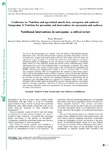Nutritional interventions in sarcopenia: a critical review
| dc.contributor.author | Hickson, Mary | |
| dc.date.accessioned | 2018-01-22T11:47:42Z | |
| dc.date.available | 2018-01-22T11:47:42Z | |
| dc.date.issued | 2015-11 | |
| dc.identifier.issn | 0029-6651 | |
| dc.identifier.issn | 1475-2719 | |
| dc.identifier.uri | http://hdl.handle.net/10026.1/10644 | |
| dc.description.abstract |
<jats:p>The aim of the present paper is to critically review the details of the published nutrition intervention trials, with and without exercise, targeting sarcopenia. Sarcopenia is the loss of muscle mass, strength and/or performance with age. Since amino acids and energy are required for muscle synthesis it is possible that nutritional intake influences sarcopenia. Nutritional studies are challenging to carry out because of the complexity of modulating dietary intake. It is very difficult to change one nutrient without influencing many others, which means that many of the published studies are problematic to interpret. The studies included evaluate whole protein, essential amino acids and β-hydroxyl β-methylbutyrate (HMB). Whole-protein supplementation failed to show a consistent effect on muscle mass, strength or function. This can be explained by the variations in study design, composition of the protein supplement and the failure to monitor voluntary food intake, adherence and baseline nutritional status. Essential amino-acid supplements showed an inconsistent effect but there are only two trials that have significant differences in methodology and the supplement used. The HMB studies are suggestive of a beneficial effect on older adults, but larger well-controlled studies are required that measure outcomes relevant to sarcopenia, ideally in sarcopenic populations. The issues of timing and distribution of protein intake, and increased splanchnic amino-acid sequestration are discussed, and recommendations for future trials are made.</jats:p> | |
| dc.format.extent | 378-386 | |
| dc.format.medium | Print-Electronic | |
| dc.language | en | |
| dc.language.iso | eng | |
| dc.publisher | Cambridge University Press (CUP) | |
| dc.subject | Sarcopenia | |
| dc.subject | Vitamin D | |
| dc.subject | Protein | |
| dc.subject | Essential amino acid | |
| dc.subject | beta-Hydroxyl beta-methylbutyrate | |
| dc.title | Nutritional interventions in sarcopenia: a critical review | |
| dc.type | journal-article | |
| dc.type | Journal Article | |
| dc.type | Review | |
| plymouth.author-url | https://www.webofscience.com/api/gateway?GWVersion=2&SrcApp=PARTNER_APP&SrcAuth=LinksAMR&KeyUT=WOS:000367581800005&DestLinkType=FullRecord&DestApp=ALL_WOS&UsrCustomerID=11bb513d99f797142bcfeffcc58ea008 | |
| plymouth.issue | 4 | |
| plymouth.volume | 74 | |
| plymouth.publication-status | Published | |
| plymouth.journal | Proceedings of the Nutrition Society | |
| dc.identifier.doi | 10.1017/s0029665115002049 | |
| plymouth.organisational-group | /Plymouth | |
| plymouth.organisational-group | /Plymouth/Faculty of Health | |
| plymouth.organisational-group | /Plymouth/Faculty of Health/School of Health Professions | |
| plymouth.organisational-group | /Plymouth/REF 2021 Researchers by UoA | |
| plymouth.organisational-group | /Plymouth/REF 2021 Researchers by UoA/UoA03 Allied Health Professions, Dentistry, Nursing and Pharmacy | |
| plymouth.organisational-group | /Plymouth/Research Groups | |
| plymouth.organisational-group | /Plymouth/Research Groups/Institute of Health and Community | |
| plymouth.organisational-group | /Plymouth/Research Groups/Plymouth Institute of Health and Care Research (PIHR) | |
| plymouth.organisational-group | /Plymouth/Users by role | |
| plymouth.organisational-group | /Plymouth/Users by role/Academics | |
| dc.publisher.place | England | |
| dc.identifier.eissn | 1475-2719 | |
| dc.rights.embargoperiod | Not known | |
| rioxxterms.versionofrecord | 10.1017/s0029665115002049 | |
| rioxxterms.licenseref.uri | http://www.rioxx.net/licenses/all-rights-reserved | |
| rioxxterms.type | Journal Article/Review |


